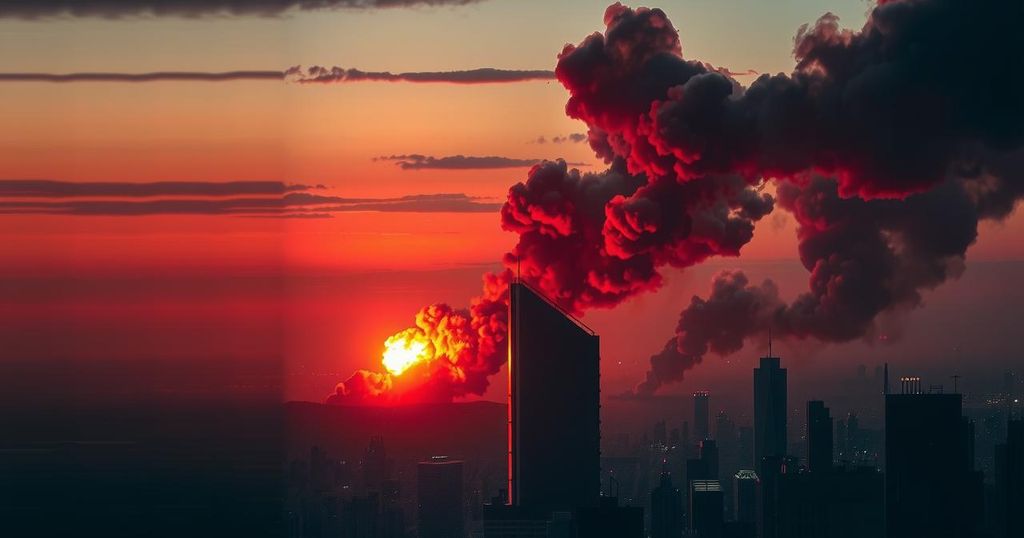Israel continues military strikes against Iran, targeting its military and energy sectors. Prime Minister Netanyahu asserts that these actions could delay Iran’s nuclear ambitions significantly. Meanwhile, Iran halted nuclear discussions amid ongoing hostilities. U.S. President Trump warned Iran of further consequences unless concessions on nuclear talks are made. The situation has raised fears of escalating conflict that might involve other regional powers.
Israel has escalated its military operations against Iran, continuing for the second consecutive day on Saturday. Prime Minister Benjamin Netanyahu indicated that the ongoing campaign would intensify, stating that the recent bombings had a significant impact on Iran’s military capabilities. Meanwhile, Iran has halted nuclear discussions in response to the attacks, which the U.S. had previously touted as the best avenue for de-escalation.
Earlier, Israel conducted a surprise attack targeting high-ranking members of Iran’s military leadership. Reports also surfaced that Israel attacked Iran’s oil and gas sectors, with a fire breaking out at a gas field, which marked a new phase in the conflict. Netanyahu claimed that these strikes could potentially delay Iran’s nuclear ambitions by years and dismissed international calls for restraint.
In the confrontation’s immediate aftermath, Iranian officials reported a deadly attack on a housing complex, claiming around 60 individuals, including children, were killed. Israel, on the other hand, stated it had targeted more than 150 locations linked to Iran’s military infrastructure. The missile volleys exchanged between the two nations have led to at least three casualties in Israel, prompting air raid sirens that sent citizens seeking shelter.
U.S. President Donald Trump praised Israel’s military actions while cautioning Iran of further escalation. He mentioned that there was still time for Iran to engage in talks for a significant reduction of their nuclear program, but added that discussions scheduled for Sunday had been canceled. Iranian Foreign Minister Abbas Araqchi criticized the idea of negotiations while under fire from Israeli assaults.
Notably, an attack that targeted Iran’s energy infrastructure in southern Bushehr province caused some gas production to cease, sparking worries over potential disruptions in oil exports. This news already inflated crude prices by approximately 7% before the airstrike took place. Also, Iranian General Esmail Kosari indicated that Tehran is contemplating closing the Strait of Hormuz, a crucial waterway for global oil transport.
As Israel anticipates that its military operation might unfold over several weeks, it has called upon the Iranian populace to oppose their ruling clerics. Heightened tensions have raised fears of a larger conflict involving other regional powers, with Israeli Defense Minister Israel Katz issuing stark warnings about the consequences if Iranian missile attacks persist.
Despite these tensions, Iran’s military capabilities have been perceived as diminished due to earlier conflicts in Gaza and Lebanon, limiting their ability to retaliate effectively. Reports from Israel indicated that the latest barrage fired from Iran included hundreds of ballistic missiles and drones, resulting in a number of casualties.
As civilians cope with the fallout from attacks, many in both Iran and Israel experience a constant environment of fear and uncertainty. In Tehran, the aftermath of the Israeli strikes has left a trail of destruction, with officials claiming significant civilian casualties. Eyewitness accounts reflected panic and chaos, underscoring the emotional toll of ongoing hostilities on ordinary citizens.
Israeli officials reaffirmed that the bombing campaign specifically targeted Iran’s nuclear facilities. Damage was notably reported in Natanz and Isfahan. Despite no actions taken on the Fordow site, Israel claimed that it had incapacitated notable military leaders and nuclear scientists responsible for advancing Iran’s nuclear program. Tehran, however, maintains that its nuclear pursuits are purely civilian, countering allegations of any intentions for weaponization. Recent findings from the UN nuclear watchdog suggested violations on Iran’s part concerning international non-proliferation agreements.
Tensions between Israel and Iran are reaching alarming levels, with military actions intensifying on both sides. Israel’s strikes aim to hinder Iran’s nuclear program and military capabilities, while Tehran has retaliated and called off crucial nuclear talks. The situation remains precarious, leading to fears of a broader conflict involving rogue elements and impacting civilians disproportionately. Analysts predict that continued escalation could have significant regional and global repercussions, affecting energy markets and international relations.
Original Source: www.euractiv.com






